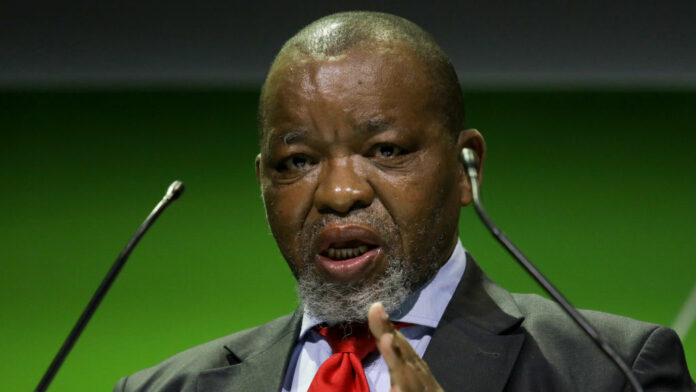
SOUTH Africa’s mines and energy minister Gwede Mantashe hit out at industry CEOs who criticised government incompetence saying they were “insulting the state”.
In a combative speech delivered at the Minerals Council’s annual general meeting today, Mantashe also appeared to attack Sibanye-Stillwater by saying certain companies were “dismantling the bargaining system”.
Mantashe recently threatened to withdraw Sibanye-Stillwater’s mining licences after the company said it could wait out a strike underway at its gold mines “for years and years”.
In a speech that lit the touchpaper on a number of controverisal subjects, Mantashe made labour relations a key topic. “We have observed with concern that the industry bargaining system is being dismantled by some companies who are taking the industry back to pre-1983 period where workers were treated as just assets,” he said.
The implication is that Mantashe views the current gold mining strike Sibanye-Stillwater’s fault. He appealed to the sector to “… appreciate that it is the responsibility of all of us to avoid long and acrimonious strike action”.
Commenting on industry criticism of government, Mantashe said he had “… observed a growing temptation to insult the state by strong and powerful mining executives”. They had “… no regard for the industry’s international ratings and its relations with government which makes it difficult to process industry issues,” he said.
Mining industry executives have been outspoken this year about failing state capacity to provide services to communities, especially located near their mines.
In February, Nico Muller, CEO of Impala Platinum said Covid-19 exacerbated the failures of local government resulting in “elevated absenteeism and heightened community dissatisfaction and lawlessness”.
Following Sibanye-Stillwater’s year-end presentation in March, the group’s CEO Neal Froneman commented: “The state of the nation verges on a failed state. Unemployment, inequality and poverty are the basic drivers of unhappiness.”
Alluding perhaps to the organisation whose AGM he was attending, Mantashe said: “The industry must further discuss the role of business associations who also find it fashionable to insult government and the governing party – ANC, projecting them as speaking for the sector”.
Asked if Mantashe’s comments represented a new ebb for industry and government relations, Minerals Council CEO, Roger Baxter said the level of “constructive engagement” between the industry and the Department of Mineral Resources and Energy (DMRE) had been the best in 20 years.
But he added: “Engaging is one thing and doing is another”, referring to the burgeoning backlog in mining and exploration permit applications.
Baxter said the council had been “… putting pressure on government” to resolve outstanding mining permits and exploration rights “that haven’t been issued within the specified time frames”. The DMRE indicated at the Mining Indaba conference in Cape Town that it had “sorted out” another 1,000 applications, but Baxter said he wasn’t sure if that excludes “additional applications taking place in the recent period”.
The DMRE said last year it had a backlog of 4,647 outstanding applications on the three licensing categories: mining permits, mining rights and permit rights. The Mpumalanga regional office accounted for 1,869 of the backlog, followed by Limpopo with 1,054.
South Africa ranked in among the ten least attractive destinations for mining industry investors according to the Fraser Institute survey, published in April. The Minerals Council expressed its concern at the finding but also quizzed the institute’s methodology which was to exclude South African mining company views.
Mantashe acknowledged the Fraser Institute findings, which rank countries by their ability to set down investor-friendly policies, but added that South Africa “must be seen to be working and not merely responding to ratings”.











